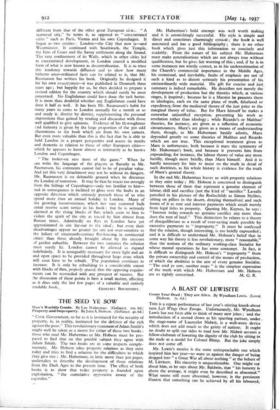THE SEED YE SOW
Man's Worldly Goods. By Leo Huberman. (Gollancz. sos. 6d.( Property and Improperty. By John A. Hobson. (Gollancz. 4s. 6d.)
" Civil. Government, so far as it is instituted for the security of property, is, in reality, instituted for the defence of the rich against the poor." This revolutionary statement of Adam Smith's might well be taken as a motto for either of these two books : those who read Mr. Huberman or Mr. Hobson must be pre- pared to find that on this painful subject they agree with Adam &frith. The two books are in some respects comple- mentary. Mr. Hobson takes property relations as they exist today and tries to find a solution for the difficulties to which they give rise ; Mr. Huberman, in little more than 30o pages, undertakes to describe the development of those relations from the Dark Ages to the present time. The effect of both books is to show that today property is founded upon exploitation, " the cumulative oppressive Dower of the capitalist."
Mr. Huberman's bold attempt was well worth making and it is astonishingly successful. His style is simple and
direct and sometimes charmingly cynical ; the book is well annotated and has a good bibliography ; there is no other book which gives just this information so concisely and readably. From the nature of his subject Mr. Huberman must make generalisations which are not always true without qualification, but he gives fair warning of this ; and, if he is in some instances not wholly correct, as in his underestimation of the Church's commercial importance in the Middle Ages, his occasional, and inevitable, faults of emphasis are not 'of such a kind as to distort seriously his presentation of his extraordinarily wide material. His gift for concise and just summary is indeed remarkable. He deScribes not Merely the development of production but the theories which, at various stages, it inspired ; because he is a Marxist he presents them as ideologies, each on the same plane of truth, falsehood or expediency, from the mediaeval theory of the just price to the marginal theory of value. But for Marx himself he makes a somewhat unjustified exception, presenting his work as revelation rather than ideology ; while Ricardo's or Malthus' theories, for instance, are given as a reflection of economic circumstances, Marx's are given as a means of understanding them, though, as Mr. Huberman hastily admits, Marx depended greatly on some theories of Malthus and Ricardo which are not true. This exceptional treatment given to Marx is unfortunate, both because it mars the symmetry of Mr. Huberman's book, and because it prevents him from expounding, for instance, the labour theory of value any more lucidly, though more briefly, than Marx himself. And it is hardly necessary for him to insist on the truth in detail of such doctrines, as his whole history is evidence for the truth of Marx's general theory.
In the end Mr. Huberman leaves us with property relations as they exist today ; Mr. Hobson is concerned to distinguish between those of them that represent a genuine element of labour, skill and sacrifice (not the" kind of "sacrifice" Lassalle parodied in his picture of the Rothschilds as Simon Stylites, sitting on pillars in the desert, denying themselves) and such forms of it as rent and interest payments which result merely from legal titles to property. Quoting Mr. Keynes, he says : "Interest today rewards no genuine sacrifice any more than does the rent of land." This distinction he relates to a theory of disequilibrium as a result of over-saving made possible by excessive payments to " improperty." It must be confessed that the relation, though interesting, is too briefly expounded ; and it is difficult to understand Mr. Hobson's belief that in some way his theory is less revolutionary, more " reasonable," than the notions of the ordinary working-class Socialist for whose mental operations he has some contempt. In fact, it is difficult to distinguish Mr. Hobson's " improperly " from the private ownership and control &the means of production, of which the abolition is the aim of every genuine Socialist. " The seed ye sow, another reaps " is the simplest expression of the truth with which Mr. Huberman and Mr. Hobson














































 Previous page
Previous page